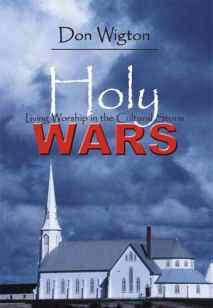Counterculture Faith
And so it is that political and religious liberalism is founded firmly in the church’s 19th century turn from biblical truth, which provided the springboard for the ‘60s revolution that in turn paganized both society and the Mainline Church. In the midst of all this turmoil the counterculture church emerged. This was a movement that conformed to its environment in many ways. Therefore the “Jesus” movement took on many aspects of the culture of those it sought to minister to. Instead of getting high on pot they got high on the Lord. The fish replaced the peace sign on the back of their Volkswagen vans as they greeted each other with the “one way” sign instead of the familiar two-fingered “V” sign of the hippies. “Give peace a chance,” “Make love not war” and “All you need is love” was the mantra of the pacifistic counterculture crowd who sought to be mellow at all cost. Therefore in the counterculture church we heard catch phrases such as “striving in the flesh” utilized to criticize Christians who put labor into their work for Christ. The call was to be laid back instead, and many of their musicians remained very stoic in their performances while talking to their audiences in a very mellow or monotone manner in order to project this idea. Many times their worship and praise music reflected the rock era that they ushered from with much of the same repetitiveness that marked the worship life of their modern bohemian counterparts.
Now there has been a lot of good that came out of that movement of God and we will refer to this in greater depth later in this blog. Its membership fled from the unbiblical denominational complexities that had been strangling the church to adopt a simpler expression of their faith based upon the Word of God rather than the influence of corrupt systems. They discarded the manipulative tactics and strategies that were plaguing the Organized Church to trust in and depend on the guidance of the Holy Spirit rather than the ingenuity of men. Ministry was servant-based with a focus on the development of spiritual gifts in the body. They sought to help parishioners find what they are called to do rather than fulfill duties that are designed around the will of the organization. Believing that the love of money had become too important to the Denominational Church they abandoned the practice of chiding people with guilt trips in order to raise money. Rather they adopted the unique practice of trusting God for their finances. The Book of Acts became their model for growth based upon the power of the Holy Spirit that came out of the dependence upon the same. Evangelism was their focus and means of church growth. And many were saved. Rather than performing meaningless rituals motivated by habit they heartily praised God with sincerity. Praise was an expression from the heart rather than routine performed by habit or rote.
However the movement did not go completely unaffected by the attitudes of the counterculture environment that surrounded it. In some regards certain charismatic leaders conformed to and adopted the anti-traditional philosophies of these non-conformists even as they attempted to pull them out of sex, drugs and their pagan religious beliefs. In many instances just as the hippies had done, these Charismatics likewise became critical of historical Christianity. Therefore Chuck Smith wrote, “I am a realist. The church, in its endeavor to make the world a better place to live, has just about wiped itself out.” Later in the same discourse he proclaimed, “I personally am not proud of the traditional church history. It seems to me that it is the story of failure.”
The hippies had revolted against the Christian-based society that we called America in the ‘50s. As you can see above, the Counterculture Church took on that very same attitude. While adopting the demeanor of the historical revisionists, many in the movement saw American history as being one tragedy after another and this was caused by the Christian religion that dominated the American cultural scene up to that point. In so doing these Charismatics challenged the same historical Christian base of America that the hippies rebelled against.
As a result in many ways they took on the cultural disposition of the new society that the Bohemians had created rather than influencing it. It’s going to go one way or the other. Christians will either change culture or be changed by it.
Rousseau had it all wrong. It was not Western Civilization, which was founded on the Christian base, that corrupted man. It was the corrupt philosophies such as those that he advanced that pervert society and therefore defile its citizens. As the history of the ancient Hebrew nation clearly testifies, it is the lack of godly influence in society that lies at the heart of the problems of any civilization. Many in the Countercultural Church failed to recognize this fact and took in the Bohemian ideal with gusto. As a result traditional church history was thrown out with the bath water.
Stay tuned for more!
The preceeding blog is an exerpt from Don Wigton’s book “Holy Wars.” Click here to purchase: http://www.authorhouse.com/BookStore/BookDetail.aspx?Book=267348
For free praise music, charts and study helps go to the Wigtune Praise and Worship Site @ http//www.praisesong.net

